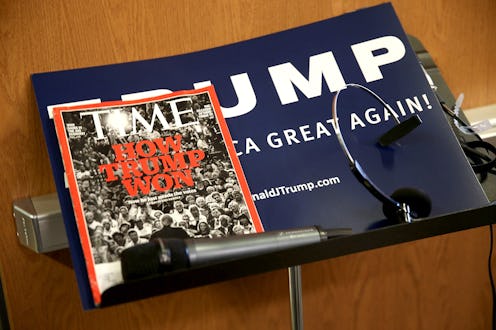Though the nominees for both the Republican and Democratic Parties have been virtually decided and the remaining primaries will be less competitive, voting in them is of the utmost importance for a few reasons. For states like California, Montana, and New Jersey, Indiana's sway in the Republican election especially was a real bummer. With 546 Democratic delegates and 172 Republican delegates, California, for example, could have called a close race.
Though their limelight has lessened, these states still play a major role in determining who has influence over their respective party.
After winning Indiana's primary on Tuesday, Republican National Committee Chairman Reince Priebus officially dubbed Donald Trump the "presumptive GOP nominee" and called for the Party to unite under the anti-establishment candidate. On the Democratic side, Bernie Sanders' chances of winning are looking slimmer, even though he won Indiana's primary. According to the International Business Times, it's now mathematically impossible for Sanders to sweep a nomination based on pledged delegates alone. However, he has a chance if he can convince Clinton's unpledged delegates to move over to his side of the turf during the National Democratic Convention. These next few reasons prove that votes still matter, even if the nominees are nearly set.
1) Voting Records Are Used To Measure Progress
How many people voted in the 2016 primary elections versus the 2008 or 2012 primary elections? Accurately measuring changes in voter turnout over the years will be difficult if voters in the remaining primaries feel defeated and decide to sit this one out. Such measurements help indicate which states need to make more of an effort to get the vote out in future elections.
2) Sanders Can Still Gain Influence Over The Democratic Party's Platform
Undoubtedly, Sanders has influenced the Democratic Party platform by proving that a significant number of voters support his progressive ideas. Most significantly, he has shown the Party that the establishment has work to do when it comes to attracting millennials — something Sanders has consistently done better than Clinton. Though he may not be able to win the election, he still has the ability to sway delegates and play a role in setting the Democratic agenda if he continues to get votes. John Sides, an associate professor of political science at George Washington University, told The Atlantic that Sanders' voters still matter.
The important thing is whether the priorities of the Sanders’s campaign and his supporters become fixtures of the party’s agenda.
3) In States With Top-Two Systems, The Decision Isn't Solidified
California, the remaining primary with the most delegates to offer, has a top-two primary system. In other words, the two candidates with the most votes, regardless of Party, will win the most delegates. Theoretically then, Sanders and Clinton, for example, could both win the state.
4) Party Dynamics Are Subject To Change
People feel very strongly about Trump's impending nomination. Democratic strategist Dan Newman told the Los Angeles Times that Trump will continue to mobilize voters, even if he has the nomination in the bag. You have to hand it to him — Trump has a special ability to fire people up, whether they're against him or in favor of him. Said Newman:
As impossible as it seems, I actually think we'll be talking about Trump even more than before now that the unthinkable is reality. He still actually inspires people to vote both for him and against him, and he gets people riled up like no one else does.
The Republicans who decide to vote against him and choose the Democratic route instead could significantly alter their state's party affiliation and, eventually, the general election. According to Dafna Linzer, Managing Editor for NBC News and MSNBC, Steven Schmidt, John McCain's former senior campaign strategist and advisor, hinted he was not voting for the presumptive GOP candidate.
Among voters, he might not be the only who decides it's time to abandon the rapidly changing Republican Party. These ideological flip flops have the potential to ultimately affect the platforms from both sides of the political aisle.
